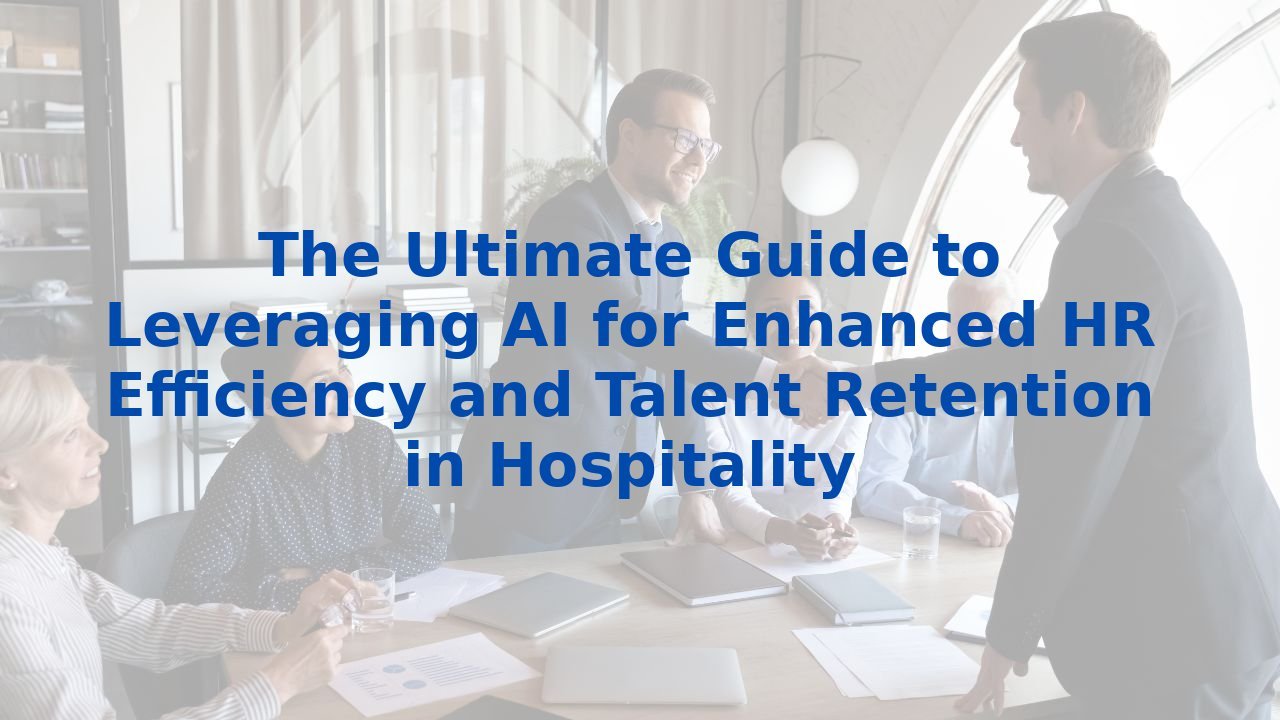The Ultimate Guide to Leveraging AI for Enhanced HR Efficiency and Talent Retention in Hospitality
The Ultimate Guide to Leveraging AI for Enhanced HR Efficiency and Talent Retention in Hospitality
Introduction
As the hospitality industry seeks to navigate through an era of rapid transformation, the integration of Artificial Intelligence (AI) stands at the forefront of this change. AI is reshaping not just the way hotels operate, but also how human resources manage talent and drive efficiency. The importance of exceptional service in hospitality has never been more critical, and leveraging AI can serve as a catalyst for enhancing HR processes and boosting talent retention.
1. Efficiency in HR Processes
In the world of hospitality, time is precious. AI can revolutionize HR operations by automating repetitive tasks that consume valuable human resources. Processes such as data entry, recruitment, and onboarding can be streamlined through AI. Imagine AI-powered chatbots handling initial candidate queries and scheduling interviews, granting HR teams more time to engage in strategic planning. By automating routine functions, organizations can foster a culture where HR professionals focus on nurturing talent rather than merely processing paperwork.
2. Employee Engagement and Development
Employee engagement is the heartbeat of any hospitality establishment. Here, AI can play a transformative role. By analyzing performance metrics, AI systems can offer personalized recommendations for training programs that align with individual career aspirations. This tailored approach not only enhances the skill set of employees but also boosts job satisfaction, leading to higher retention rates. When employees feel invested in their development, they are likely to remain dedicated to their organization, enriching the overall guest experience.
3. Talent Retention
Attracting top talent is just the beginning; retaining it is an ongoing challenge, especially in hospitality. AI can assist HR in identifying the ideal candidates by analyzing extensive datasets of employee profiles and predicting who will thrive in specific roles. Furthermore, AI can gauge employee sentiments through feedback analysis, allowing management to understand and address concerns proactively. By fostering a supportive environment, organizations can cultivate loyalty and engagement among their staff.
4. Work Culture and Leadership
The role of leadership is pivotal in shaping an appealing work culture. Here, AI insights can be invaluable. With tools that conduct sentiment analysis, leaders gain clarity on employee perceptions, enabling them to make informed decisions that align with workforce morale. This data-driven approach is key to preemptively tackling issues that could otherwise undermine team cohesion. When leaders stay attuned to the pulse of their workforce, they create an environment conducive to heightened engagement and productivity.
5. Benefits of AI Training for Employees
While AI holds immense potential, its success hinges on the people who wield it. Training employees in AI usage is crucial for maximizing its benefits. Empowering employees to understand how to interact with AI tools effectively—formulating targeted questions, evaluating AI outputs, and integrating insights into their workflows—can dramatically enhance overall productivity. Furthermore, fostering a workforce proficient in AI not only optimizes operations but also prepares the organization to adapt to future innovations.
6. Challenges and Considerations
Despite its myriad benefits, the adoption of AI in HR is not without challenges. There are concerns about the relevance of AI-generated content and the potential for inaccuracies, such as AI creating misleading references. It is essential for HR professionals to work closely with AI systems and ensure the human touch is always present. Developing clear guidelines and strategies to monitor AI outputs will help maintain integrity while reducing the risk of pitfalls associated with automation.
Conclusion
In summary, integrating AI into hospitality HR processes presents a unique opportunity for organizations to enhance efficiency, enrich employee engagement, and bolster talent retention. By leveraging AI's strengths in data analysis, personalized training, and insightful leadership, hotel management can foster a culture that not only attracts top talent but also embraces it. However, to truly unlock the potential of AI, a balanced approach that addresses its challenges is necessary. The future of the hospitality industry hinges on our ability to embrace intelligent technologies while keeping our human-centric focus intact.
Embrace change and lead your organization into a new era of hospitality excellence through the transformative power of AI.



